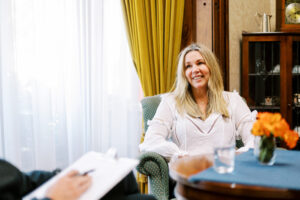In times of crisis and uncertainty, it is crucial to prioritise our wellbeing and practise self-care. Faith and spirituality offer a sense of stability and security in God’s love and plan, empowering us to make wise choices that contribute to our overall wellbeing. Understanding faith can ground us as we navigate the challenges of managing our mental and emotional health. In this article we explore the intersection of faith and wellbeing in supporting personal growth during difficult situations.
The Power of Agency
Empowerment and agency are vital in managing mental and emotional health challenges. We must recognise that God has given us the agency to make wise choices that allow us to take ownership of our wellbeing. By stepping into those choices, we can navigate life’s challenges with greater resilience and purpose. We have the power to prioritise our self-care and make decisions that contribute to our overall health and flourishing.
Amidst the darkness, it is essential to seek out the light. While crises can be overwhelming, it is important to remind ourselves that good things are still happening in the world.
For instance, the increased emphasis on work-life balance and a re-centring on restoration and harmony in our lives are positive shifts in our culture. Actively seeking out and celebrating these uplifting changes can provide us with hope and encouragement, counterbalancing the negativity that often dominates the media.
Understanding the Christian Perspective
Mental and emotional health challenges extend far beyond individuals; they affect every aspect of our community. Families are particularly impacted, as the wellbeing of one family member can significantly influence the dynamics and overall happiness of the entire unit. Creating safe spaces within our families and communities is crucial, where open conversations about mental health can occur without fear of judgement or stigma.
In the face of these challenges, Christians can find solace and guidance in their faith. Christian teachings remind us that we are not alone in our struggles and that there is hope even amid the most trying circumstances.
Lament, an integral part of the Christian tradition, acknowledges the brokenness of the world while also expressing faith in the ultimate redemption and restoration that is to come. Through this lens of faith, Christians can find strength and support in their journey toward mental and emotional wellbeing.
Embracing Spiritual Disciplines that Support Self-Care
Self-care is never a selfish act, it is simply good stewardship of the only gift you have, the gift you were put on earth to offer others. It is therefore a healthy and an essential practice for maintaining our wellbeing, enabling us to better serve others. It involves intentionally looking after ourselves to be as healthy as possible.
What might self-care look like in practice? Spiritual disciplines that support self-care are not about rigidly obeying rules; they are pathways to living life to its fullest.
Building intentional white space into our calendars is integral to both spiritual and self-care. This allows us to rest, reflect, and rejuvenate our spirits, creating a space for connection with God and ourselves.
Jesus himself exemplified the importance of prioritising solitude and connecting with God for the sake of others. Practices such as prayer, fasting, silence, and meditation hold significant value in nurturing our spiritual and emotional wellbeing. They help us cultivate a deeper connection with God and ourselves, providing moments of peace, guidance, and restoration.
Keep in mind that in our pursuit of self-care and wellbeing, it is important to approach sustainable sacrifice. Jesus serves as the ultimate example of sacrificial love, but even He prioritised solitude and connection with God. By following His example, we learn that self-care is not selfish. It is a necessary act of stewarding the life and gifts God has entrusted to us. By nurturing our own wellbeing, we are better equipped to serve and love others wholeheartedly.
Rediscovering the Power of the Sabbath
As people of faith and following the catalytic change of the pandemic, we have a unique opportunity to rediscover and renew our understanding and application of biblical work and rest to a weary world that is seeking life. Palker Palmer captures the essence of this opportunity saying,
“… action and contemplation (work and rest) originate and return to the same place – and that place is our ceaseless desire to be fully alive.”
Moreover, in a culture that glorifies busyness and productivity, the concept of the Sabbath offers a radical self-care alternative. Sabbath is not merely a day off; it is about intentional rest, restoration, and saying no to the relentless demands of the world. By embracing the gift of the Sabbath, we create space to connect with God, rest our bodies and minds, and engage in activities that bring us true joy and rejuvenation.
Sabbath allows us to step away from the constant pressures of work and obligations, reminding us that our worth is not solely defined by productivity. It is a time to prioritise self-care, engage in activities that bring us delight, and foster deeper connections with loved ones.
Sabbath challenges the cultural narrative that busyness equals success. It encourages us to resist the temptation to constantly be on the go and to find balance in our lives. We can break free from the cycle of burnout and recharge our physical, mental, and spiritual batteries.
You Cannot Pour from an Empty Cup
Investing in self-care is crucial, particularly during crisis situations. We can navigate the challenges with resilience and hope by recognising the power of agency and empowerment, seeking light in the darkness, and anchoring ourselves in faith.
Redefining community and leaning into our most cherished relationships enable us to build a support system that nurtures and uplifts us. Practising intentional self-care through spiritual disciplines, intentional white space, and embracing the gift of the Sabbath allows us to cultivate holistic wellbeing.
Let us prioritise self-care as an act of love for ourselves and others, nurturing our own wellbeing so that we can make a positive impact on the world around us.
To listen to how you can grow your capacity to mental health challenges in your marriage, family, work, church and community, download aifc’s latest webinar here.
 About aifc
About aifc
Do you want to be prepared and equipped for your calling to help others? aifc offers accredited courses, as part of the counselling training pathway, in partnership with the Australian College of Ministries, a Sydney College of Divinity member, for those wishing to pursue or add to professional counselling qualifications.
To explore more of aifc’s counselling courses go to https://www.aifc.com.au




Have you thought about becoming a qualified counsellor? It’s a great opportunity to learn how you can extend God's love and grace to the hurting out in the community.
For those who would like to enrol in aifc’s accredited Christian counselling courses we have two intakes per year for courses commencing around the following months:
Enrolment Season - opens approximately 2 months prior to our courses commencing. Enrol online here during our enrolment season.
We also offer two modes of study:
A Master of Counselling course was introduced in 2018.